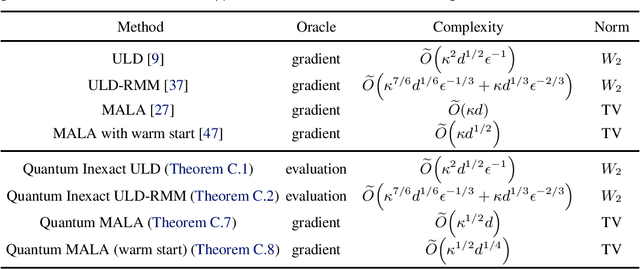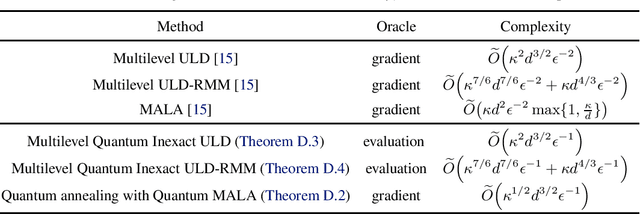Quantum Algorithms for Sampling Log-Concave Distributions and Estimating Normalizing Constants
Paper and Code
Oct 12, 2022

Given a convex function $f\colon\mathbb{R}^{d}\to\mathbb{R}$, the problem of sampling from a distribution $\propto e^{-f(x)}$ is called log-concave sampling. This task has wide applications in machine learning, physics, statistics, etc. In this work, we develop quantum algorithms for sampling log-concave distributions and for estimating their normalizing constants $\int_{\mathbb{R}^d}e^{-f(x)}\mathrm{d} x$. First, we use underdamped Langevin diffusion to develop quantum algorithms that match the query complexity (in terms of the condition number $\kappa$ and dimension $d$) of analogous classical algorithms that use gradient (first-order) queries, even though the quantum algorithms use only evaluation (zeroth-order) queries. For estimating normalizing constants, these algorithms also achieve quadratic speedup in the multiplicative error $\epsilon$. Second, we develop quantum Metropolis-adjusted Langevin algorithms with query complexity $\widetilde{O}(\kappa^{1/2}d)$ and $\widetilde{O}(\kappa^{1/2}d^{3/2}/\epsilon)$ for log-concave sampling and normalizing constant estimation, respectively, achieving polynomial speedups in $\kappa,d,\epsilon$ over the best known classical algorithms by exploiting quantum analogs of the Monte Carlo method and quantum walks. We also prove a $1/\epsilon^{1-o(1)}$ quantum lower bound for estimating normalizing constants, implying near-optimality of our quantum algorithms in $\epsilon$.
 Add to Chrome
Add to Chrome Add to Firefox
Add to Firefox Add to Edge
Add to Edge